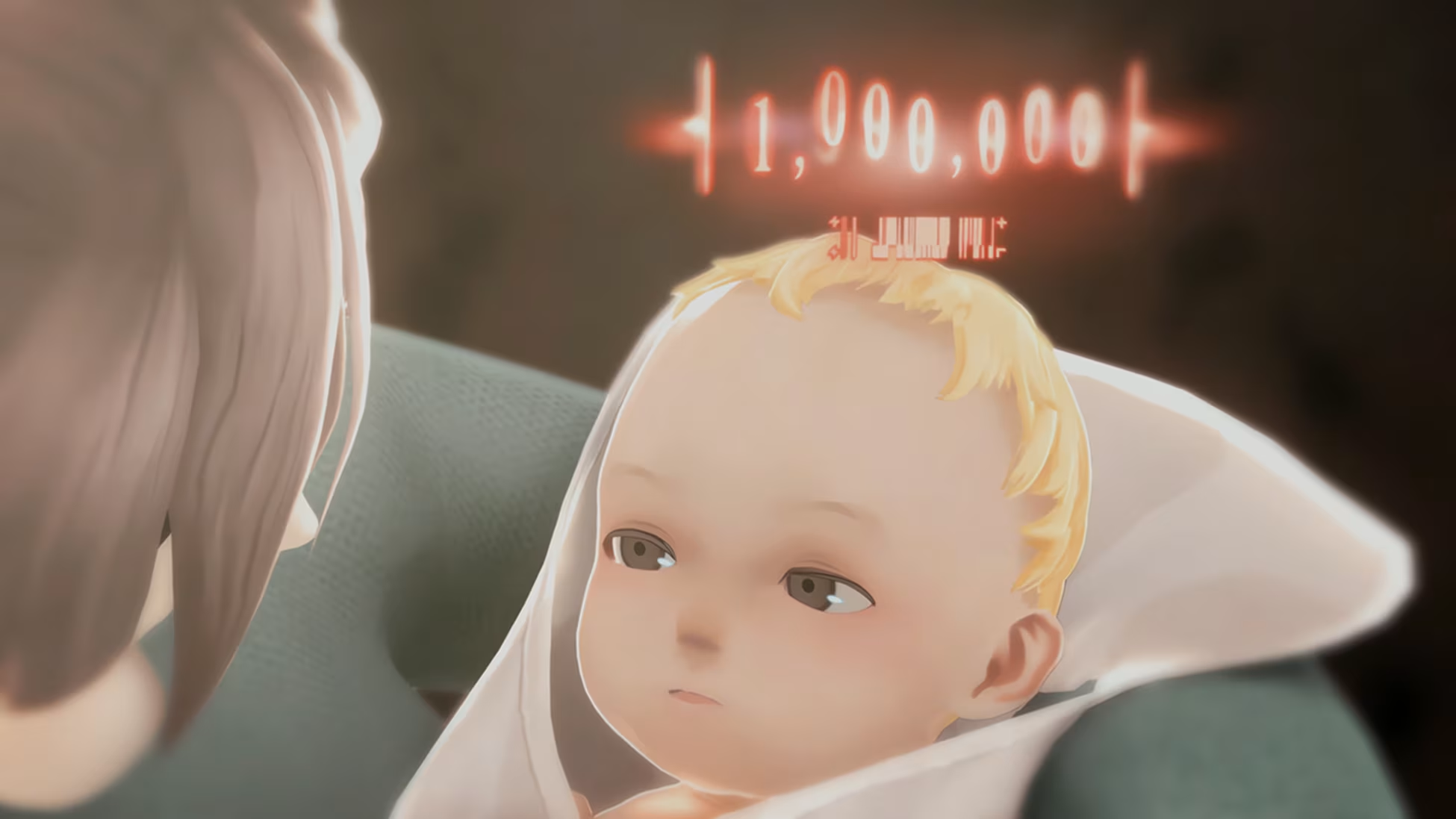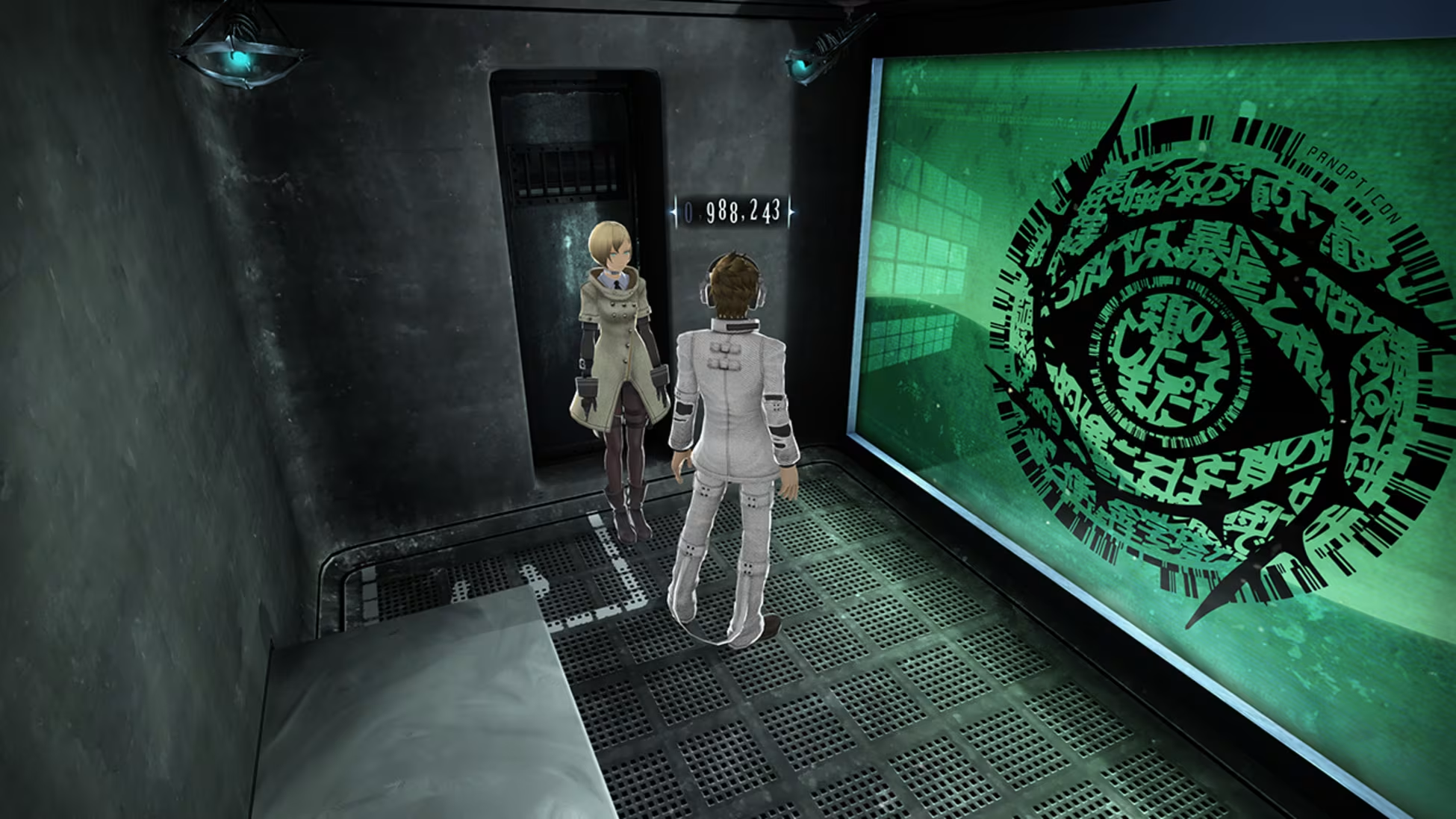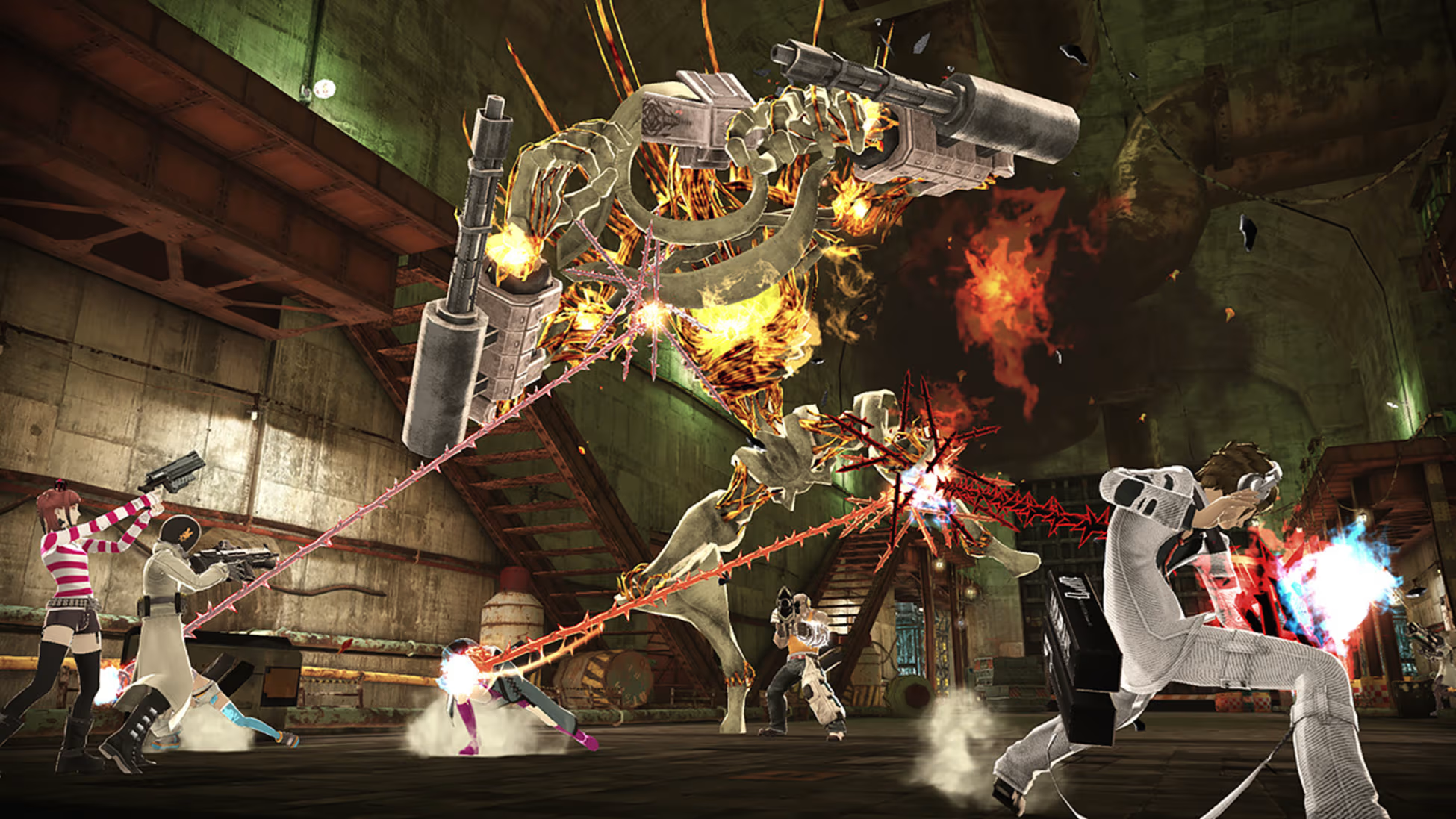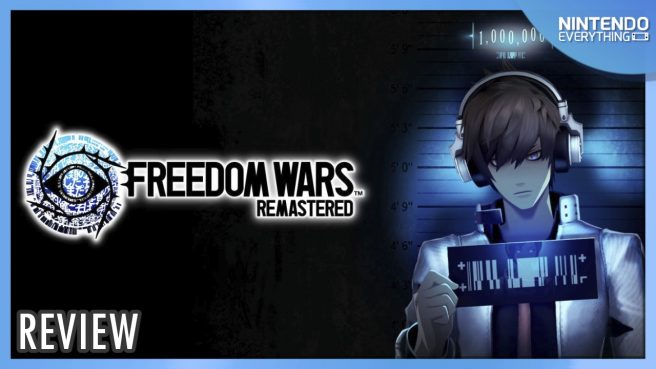Freedom Wars Remastered review for Nintendo Switch
System: Switch
Release date: January 10, 2025
Developer: Dimps
Publisher: Bandai Namco
Despite the overwhelming and uncontested success of the Nintendo 3DS, I have always felt as though Sony gave up on the PlayStation Vita far too soon, and Freedom Wars is a fine illustration of this point. Originally released in 2014, the game went on to become one of the most successful first-party published titles for the system in Japan and easily filled the void left by the departure of Capcom’s Monster Hunter franchise to Nintendo systems. With its post-apocalyptic dystopian setting, more detailed narrative, and varied mission structure that went beyond simply hunting large single targets over and over again, it felt like the next step for hunting-style action RPGs, limited only by its chosen platform. Playing through the game again over a decade later, Freedom Wars Remastered holds up surprisingly well.
We have no shortage of video games set in post-apocalyptic worlds at this point, but Freedom Wars’ take on the concept remains as refreshing and unique as it was when it was first released. The world has been devastated by pollution, and in the aftermath of the devastation they have wrought, mankind has formed a cluster of smaller city states known as Panopticons. Resources are scarce, and to ensure the human race’s continued survival, for all but the privileged few, the very act of living has become a crime.
Unfortunately for you, you are not one of those lucky individuals deemed to be worthy of resources. Calling you a servant, or even a slave, to your Panopticon (which you are at least allowed to choose yourself at the game’s beginning) would be a kind descriptor. The game takes an almost perverse delight in drilling that fact into you repeatedly even before the tutorial ends. You’ll unwittingly commit multiple transgressions as you progress through the story, tacking on dozens or hundreds of years to your already outrageous prison sentence for doing the simplest of things. It’s difficult not to feel claustrophobic when trapped in your tiny cell, being continually monitored by your Accessory, which frequently mispronounces words in a badly translated text-to-speech style AI monotone that is its own kind of torture.
It’s a highly effective and uniquely disturbing presentation, and drips down into every facet of Freedom Wars. You need permission to do even the most basic tasks, and a lot of what we would take for granted as quality-of-life features in modern titles are completely denied to you until you have earned them in-game; even the act of simply saving your game is accompanied by a small dialogue from your Accessory acknowledging your request to do it. The lengths to which Freedom Wars will go to emphasize your standing in its world are often petty and pathetic, but also pure genius, as you’re pulled inexorably into the world of your Panopticon prison and constantly reminded that there is no escape.

So, what can you do to make this life more bearable? Why would you even want to engage with a game that treats you with such contempt? Despite presenting you with a seemingly insurmountable grind and striving to make life as difficult for you as possible, Freedom Wars is nonetheless strangely captivating and highly motivating. Whatever it might tell you to the contrary, this is a game that very much wants you to succeed, and it makes every small step that you take towards doing so feel like a significant achievement; with greater restrictions come greater rewards.
To give meaning to your existence, you are expected to undertake missions in service to your Panopticon. As you might expect, these are timed excursions out into the post-apocalyptic battlefields of the world, and form the core of Freedom Wars’ gameplay. There is a surprising amount of variety on offer in terms of mission objectives: as well as battles against singular titanic Abductors, you’ll also be tasked with taking on waves of smaller, slightly less dangerous (at least individually) adversaries, rescuing captured civilians, or simply reaching a destination in time. As you progress time restrictions become noticeably tighter, and many operations will have multiple objectives to complete, although the grind for resources to keep on top of the equipment you’ll need to clear these never requires that you step away from the main missions for very long.
Despite the core of its game representing one arduous, million-year grind to work off your sentence, Freedom Wars does a remarkably good job at making this feel like natural progression rather than repetitive busywork. You will of course need to upgrade your weapons and gear in order to deal with the progressively stronger opponents you will face, and the game facilitates this through a crafting system that is fairly simple to understand, albeit somewhat difficult to navigate at times through layers of menus. There are six different types of weapons, further split into three different types of firearms and bladed weapons respectively, to cater to your preferred playstyle, and the ability to take two weapons at a time with you allows for a greater degree of flexibility. Each weapon handles quite differently, bringing its own advantages to combat that you’ll need to become accustomed to. The game feels adequately balanced in this respect; although you will undoubtedly gravitate towards specific weapon types, each has its own niche that makes it a viable choice in combat.

As well as your weapons of choice you’ll also be allowed to bring a Thorn Whip, a handy device that adds an element of verticality to the game, allowing you to grapple onto scenery to quickly ascend it. Or more commonly, Abductors, to better allow you to drag them down, grapple onto them to shear away their parts, or rescue helpless civilians trapped inside. As with weapons, there are different types of Thorn Whip to consider: Binding allow you to set traps and stun enemy Abductors more easily, Healing allows you to both directly and indirectly heal your allies, and Shielding enhances defense and can be used to nullify smaller damage sources that can quickly become out of control in some instances. Unlike its contemporaries in the genre, Freedom Wars often feels like a more tactical experience, requiring more than proficiency in a single type of weapon in order to succeed. This is especially true when playing alone, where you’ll often need to micromanage AI companions as well as your own actions, although they prove surprisingly competent in most instances. Using firearms can transform the game from a hack-and-slash into a third-person shooter, as you snipe enemies from a distance and utilize cover to avoid retaliatory fire.
Your prize for completing these missions is to knock a few years off your prison sentence, some valuable resources to upgrade your equipment, and privileges that will make your existence at the Panopticon a little more bearable. Work hard enough and you might be permitted to lie down in your cell to rest or talk to your fellow Sinners. It’s a gameplay loop that anyone who has played a Monster Hunter title will be intimately familiar with by this point, and it lends itself well to short handheld play sessions in particular. Of course, serving your Panopticon is also its own reward. The more of your hard-won resources that you donate, the more years you’ll knock off your prison sentence, and the more freedom you will earn. This creates an interesting dilemma: should you donate everything to serve the greater good or are these resources going to be necessary for your survival when you next venture out of your cell? The game never pushes you in any particular direction, although some items, marked in a very forbidding red, you will not be allowed to keep at all initially. These are often the most useful and, by their very nature of being forbidden, the most tantalizing.

Although Freedom Wars has an extremely slow beginning with an outrageous number of restrictions, once you begin to unlock things that you would have taken for granted in other titles – such as fast travel – it becomes far more engaging, and the additions to your prison sentence you will inevitably receive for committing various transgressions feel more like a challenge to your autonomy rather than a punishment for daring to express it. Gaining the ability to socialize with your fellow Sinners also makes the game’s heavy narrative more engaging, and make the longer cutscenes more bearable in the slower opening hours while the game takes time establishing the basis for the wider conflict and your part in it.
The quality of life features added to Freedom Wars Remastered make it a much more approachable title than the original. Despite the occasional stiffness to movement that betrays its age, and a floaty verticality that can make precise aiming a little difficult at times in the heat of the moment, the ability to fully remap controls was an addition I found to be particularly welcome. The default control scheme feels extremely awkward, a flaw that it shares with the original title, which was similarly unwieldy. The English voice acting is mostly on-point, although the ability to switch to the original Japanese audio is available, hidden behind a bizarrely named option, and many will likely feel it should have been the other way around.
The game unfortunately feels more akin to a port than a remaster in truth on the Nintendo Switch, as it is locked to a disappointing 30 frames per second and has a lower resolution compared to other platforms, although at 1080p in docked it is still a significant step up over the original release. Despite being a lower frame rate, performance remains comfortably stable and only makes the game feel slightly slower on the system when compared to other systems as combat tends towards the methodical rather than blindingly fast action, and loading times are not frustratingly longer. The game is at its best in handheld, where the lower resolution becomes less of an issue, although if you intend to spend your time playing the game on a TV screen, the optimal experience would be found on other platforms.
The Verdict

Freedom Wars Remastered is quite the paradox. Even as it kicks you down and reminds you that you are at the bottom of society’s ladder it inspires you to do more, setting goals that seem insurmountable but never making it too difficult to make steady progress towards them. Its unique dystopian take on the post-apocalyptic and slightly more varied mission structure go a long way towards taking the edge off of the repetitive and grindy nature of its gameplay, and although it still feels slightly archaic on the Nintendo Switch thanks to a disappointing frame rate and awkward control scheme, it does just enough to measure up to modern standards. If you’re after something to scratch that hunting itch – especially if you have some friends to play it with – this is definitely one worth considering.
Freedom Wars Remastered copy provided by the publisher for the purpose of this review.
